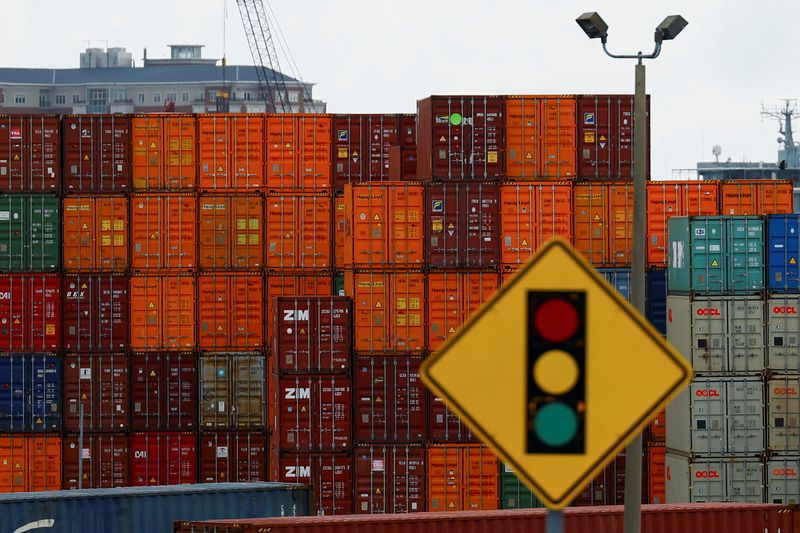By Doyinsola Oladipo
NEW YORK (Reuters) - A strike by dockworkers on the U.S. East Coast and Gulf Coast that disrupted much of the nation's ocean shipping this week ended on Thursday, but a key issue driving labor unrest across the continent - the growing use of automation - was unresolved.
Companies view automation as a path to better profit while unions see it as a job-killer. For North American dockworkers battling automation, Europe's port worker contracts may point a way to resolve the issue.
Some 45,000 port workers from the International Longshoremen's Association union late on Thursday ended a three-day strike that had shut ocean shipping from Maine to Texas after reaching a tentative deal on wages.
The workers and port operators agreed to extend their contract to Jan. 15, 2025, while talks continued. A key sticking point in the negotiations for a new six-year labor contract is automation.
"We got to keep fighting automation and semi-automation," ILA’s leader, Harold Daggett, told a group of workers during the strike outside the Maher terminal in Elizabeth, New Jersey, as they held signs reading "Machines don't feed families" and "Fight automation, save jobs."
The union claims the use of an automated gate system at a port in Mobile, Alabama violates their contract.
The port is run by Netherlands-based APM Terminals, a member of the United States Maritime Alliance (USMX) employer group. The auto gate system can process trucks entering and leaving the port using digital scans, without the help of unionized labor, according to ILA.
APM Terminals, owned by A.P. Moller-Maersk, told Reuters the auto-gate has been in place since the terminal opened in 2008 and that it remains in full compliance with the ILA/USMX master contract.
USMX declined to comment on the issue.
CANADA FIGHT
Automation has also cropped up in other port labor disputes in the U.S. and Canada that have shaken global trade, stretching from Los Angeles to Vancouver.
In June, 99% of the International Longshore and Warehouse Union (ILWU) Local 514 workers in Canada rejected what was then called the final offer of the British Columbia Maritime Employers Association (BCMEA), covering seaports in the Canadian province.
The union was upset in part because logistics company Dubai Ports World Canada had put the labor group on notice that it would unilaterally introduce automation at a key rail yard at the Port of Vancouver.
"Workers are challenging automation because they know the negative effects that disappearing jobs have on our families and communities," an ILWU Coast Longshore Division spokesperson said on Tuesday.
The BCMEA and ILWU Local 514 have been negotiating on an industry-wide basis since November 2022.
Last year, more than 7,300 workers went on strike in Vancouver as automation became a sticking point with the BCMEA. The ILWU sought to include language in contracts about training workers to repair new machinery introduced at the ports.
The Pacific Maritime Association (PMA), which represents terminal operators from California to Washington state, said union workers in 2023 "effectively shut down" terminals at ports including Los Angeles, Long Beach and Oakland in California when negotiations hit the 13-month mark.
A report underwritten by the ILWU representing West Coast dockworkers found that in 2020 and 2021, the Long Beach terminal had 392 fewer jobs than it would have had if it were not automated.
A competing report commissioned by the PMA found that paid hours at Los Angeles ports had risen by 31.5% since automation began in 2016. The authors declined to provide figures for Long Beach alone.
In the new six-year contract, the union and PMA said they would establish a minimum staffing agreement for terminals that introduce automated equipment and discuss new technological changes.
EUROPEAN CONTRACTS
In Europe, port workers' unions have already negotiated protections against automation, after Europe Container Terminals opened the world's first automated container terminal in Rotterdam in 1993, according to Berardina Tommasi, policy officer at the European Transport Workers' Federation for dockworkers.
"Nobody can be sacked because of automation," said Niek Stam, secretary of FNV Havens, the largest Dutch dockworkers' union.
The Dutch union has more than 6,000 members across three ports in the Netherlands including the Port of Rotterdam, which is considered one of the most technologically advanced in the world. "We've had this in our contracts for many years," Stam said.
Even so, the union is looking to address issues around automation in its current contract negotiations, over worries about career longevity as automation reduces the number of less intense roles at ports.
"We have to talk about early retirement [with terminal operators] because workers can’t work until 67 doing the most labor-intensive jobs," Stam said.
A certain level of automation is tolerable in the dockworker industry, according to some European and U.S. union officials.

"We're not opposed to bringing in technology that makes us more efficient," said Shaheem Smith, 41, a New Jersey crane operator and ILA strike captain.
"But when you start trying to make things that's going to take our job - that's when we have the issue."